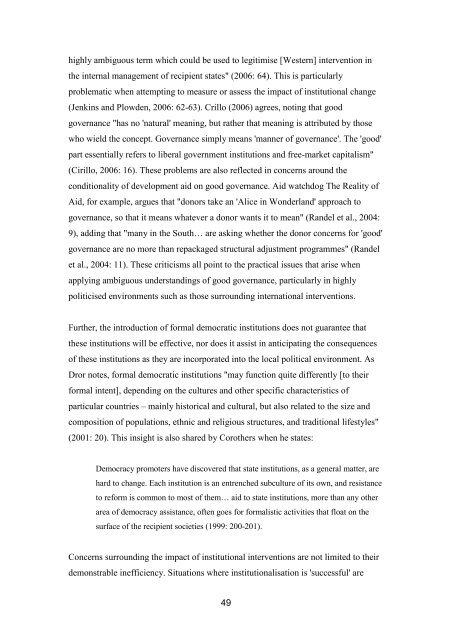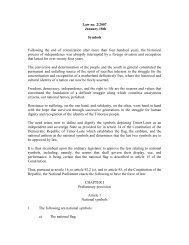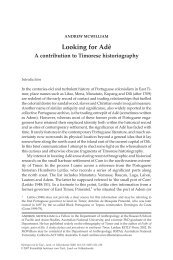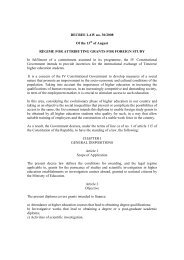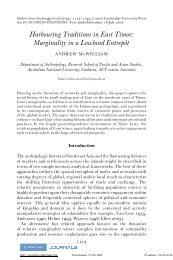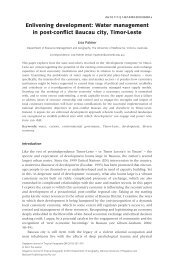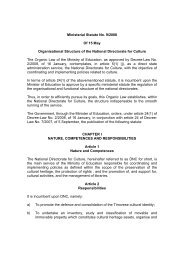Local Governance in Timor-Leste - Secretaria de Estado da Arte e ...
Local Governance in Timor-Leste - Secretaria de Estado da Arte e ...
Local Governance in Timor-Leste - Secretaria de Estado da Arte e ...
- No tags were found...
You also want an ePaper? Increase the reach of your titles
YUMPU automatically turns print PDFs into web optimized ePapers that Google loves.
highly ambiguous term which could be used to legitimise [Western] <strong>in</strong>tervention <strong>in</strong>the <strong>in</strong>ternal management of recipient states" (2006: 64). This is particularlyproblematic when attempt<strong>in</strong>g to measure or assess the impact of <strong>in</strong>stitutional change(Jenk<strong>in</strong>s and Plow<strong>de</strong>n, 2006: 62-63). Crillo (2006) agrees, not<strong>in</strong>g that goodgovernance "has no 'natural' mean<strong>in</strong>g, but rather that mean<strong>in</strong>g is attributed by thosewho wield the concept. <strong>Governance</strong> simply means 'manner of governance'. The 'good'part essentially refers to liberal government <strong>in</strong>stitutions and free-market capitalism"(Cirillo, 2006: 16). These problems are also reflected <strong>in</strong> concerns around theconditionality of <strong>de</strong>velopment aid on good governance. Aid watchdog The Reality ofAid, for example, argues that "donors take an 'Alice <strong>in</strong> Won<strong>de</strong>rland' approach togovernance, so that it means whatever a donor wants it to mean" (Ran<strong>de</strong>l et al., 2004:9), add<strong>in</strong>g that "many <strong>in</strong> the South… are ask<strong>in</strong>g whether the donor concerns for 'good'governance are no more than repackaged structural adjustment programmes" (Ran<strong>de</strong>let al., 2004: 11). These criticisms all po<strong>in</strong>t to the practical issues that arise whenapply<strong>in</strong>g ambiguous un<strong>de</strong>rstand<strong>in</strong>gs of good governance, particularly <strong>in</strong> highlypoliticised environments such as those surround<strong>in</strong>g <strong>in</strong>ternational <strong>in</strong>terventions.Further, the <strong>in</strong>troduction of formal <strong>de</strong>mocratic <strong>in</strong>stitutions does not guarantee thatthese <strong>in</strong>stitutions will be effective, nor does it assist <strong>in</strong> anticipat<strong>in</strong>g the consequencesof these <strong>in</strong>stitutions as they are <strong>in</strong>corporated <strong>in</strong>to the local political environment. AsDror notes, formal <strong>de</strong>mocratic <strong>in</strong>stitutions "may function quite differently [to theirformal <strong>in</strong>tent], <strong>de</strong>pend<strong>in</strong>g on the cultures and other specific characteristics ofparticular countries – ma<strong>in</strong>ly historical and cultural, but also related to the size andcomposition of populations, ethnic and religious structures, and traditional lifestyles"(2001: 20). This <strong>in</strong>sight is also shared by Corothers when he states:Democracy promoters have discovered that state <strong>in</strong>stitutions, as a general matter, arehard to change. Each <strong>in</strong>stitution is an entrenched subculture of its own, and resistanceto reform is common to most of them… aid to state <strong>in</strong>stitutions, more than any otherarea of <strong>de</strong>mocracy assistance, often goes for formalistic activities that float on thesurface of the recipient societies (1999: 200-201).Concerns surround<strong>in</strong>g the impact of <strong>in</strong>stitutional <strong>in</strong>terventions are not limited to their<strong>de</strong>monstrable <strong>in</strong>efficiency. Situations where <strong>in</strong>stitutionalisation is 'successful' are49


